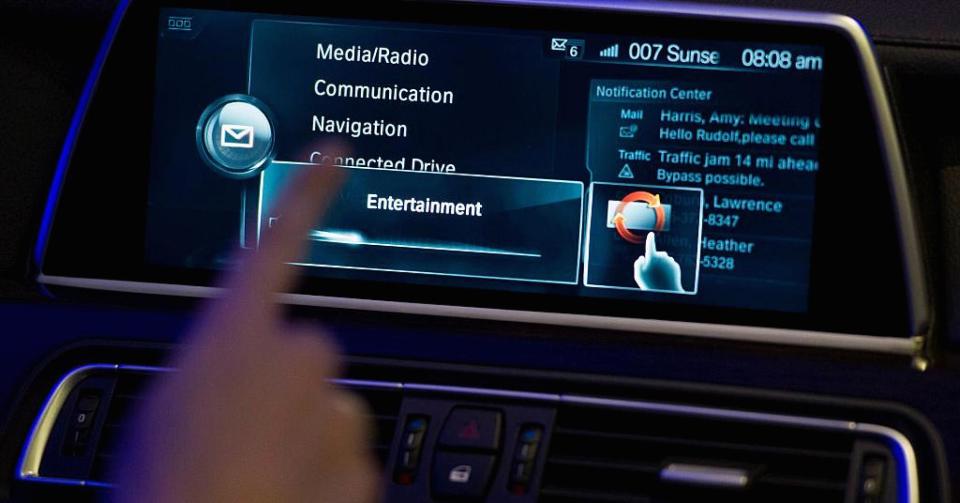One day pretty soon, your car will be as smart as your phone

Imagine driving to an important meeting when a traffic jam puts a wrench in your schedule. You wonder if leaving the house earlier would have made a difference, as vehicles slowly crawl along the road.
German automaker BMW (BMW-DE) believes that kind of irritation will soon be a thing of the past, thanks to a smartphone app that can alert users to leave for destination earlier, by calculating expected driving time and current traffic conditions.
Once inside the car, data from the BMW Connected app automatically syncs with BMW's in-car navigation system, which maps out the best route to take. The driver can send a pre-worded SMS message en-route about their arrival time to selected contacts directly from the vehicle.
The app offers other functions, such as controlling the car's interior temperature, security devices, the horn and headlights, remotely using a smartphone.
Automakers have been working to put in more technology into cars as increasingly connected consumers up their expectations, and as non-traditional players such as Google and Apple move into the automakers' space with big investments in autonomous vehicle projects.
"Smartphone users are in the midst of the mobile mind shift, where they begin to expect new levels of assistance and anticipation for daily changes," Frank Gillett, an analyst at Forrester who advises chief information officers, said in a June report.
Forrester's report found there was a strong, global interest in connected-car features, such as interactive voice responses, in-car internet connectivity, location-based statuses about their contacts and an app store for car apps.
In Asia, China, India and South Korea were the most interested in connected cars, the report found; China is one of the largest smartphone markets in the world currently, with India snapping at its heels.
To cater to the vast potential of the domestic market, Chinese automakers and tech companies are also looking into the possibilities that could be unlocked if a car could "think" in the way that smartphones or tablets can.
In July, e-commerce giant Alibaba and SAIC Motor, China's biggest car manufacturer, launched a sports utility vehicle (SUV) that featured Alibaba's YunOS operating system..
Two months earlier, Chinese conglomerate LeEco launched the self-driving , smart LeSEE supercar, which was designed to rival Tesla's Model X.
All this investment is aimed at capturing a lucrative market.
Consulting firm PwC said in a September 2015 report that it expected annual sales of connected-car technologies to grow 204 percent to 122.6 billion euros ($136.71 billion) between 2016 and 2021.
PwC predicted automakers would "take on a new identity as providers of mobility services."
It picked out Volkswagen, Daimler, Ford and BMW as the leaders in connected car innovations and R&D among top-tier car makers.
But these investments are not necessarily transforming into satisfied customers.
Gillett told CNBC that automakers lacked expertise compared to more established technology companies, which meant the overall customer experience "isn't very good." Many car makers are trying to work with app developers to put apps in their in-car infotainment systems, making the market more fragmented, he said.
The Forrester report found customers complained that tech systems built by auto makers were confusing, too complex, and were difficult to pair with smartphones. If carmakers worked with established tech companies, customer experience could be improved, according to Gillett.
"Instead what you have more of is a battle between them, where the carmakers are somewhat resistant to integrating with the phone and they end up making more difficult experiences," he said.
Another issue automakers face is convincing users to give up their existing cars in favor of new smart cars.
Gillett said there were technologies available that could transform an old, "dumb" car into a smart car by retrofitting devices that offer similar functions as a smart car.
For example, U.S.-based Rand McNally offers several touch-screen devices that can be retrofitted to a car, offering services such Bluetooth-enabled hands-free calling, texting, music steaming, a built-in dash cam and a platform to download apps, games, music and audio books.
In fact, this could be the next smart-car battleground, Gillett said.
Service providers such as insurance companies, repair and roadside assistance companies, and even highway convenience stores could tap into currently available technology to offer retro-fitted smart products, he said.
"Five years from now, not only will we see more connected cars, [we'll see] a real battle with these retro-fit devices from non-car companies. That battle will be in full gear by then," he said.

 Yahoo Autos
Yahoo Autos 
